The Cambridge History of China. Vol. 13: Republican China 1912-1949, Part 2
Подождите немного. Документ загружается.

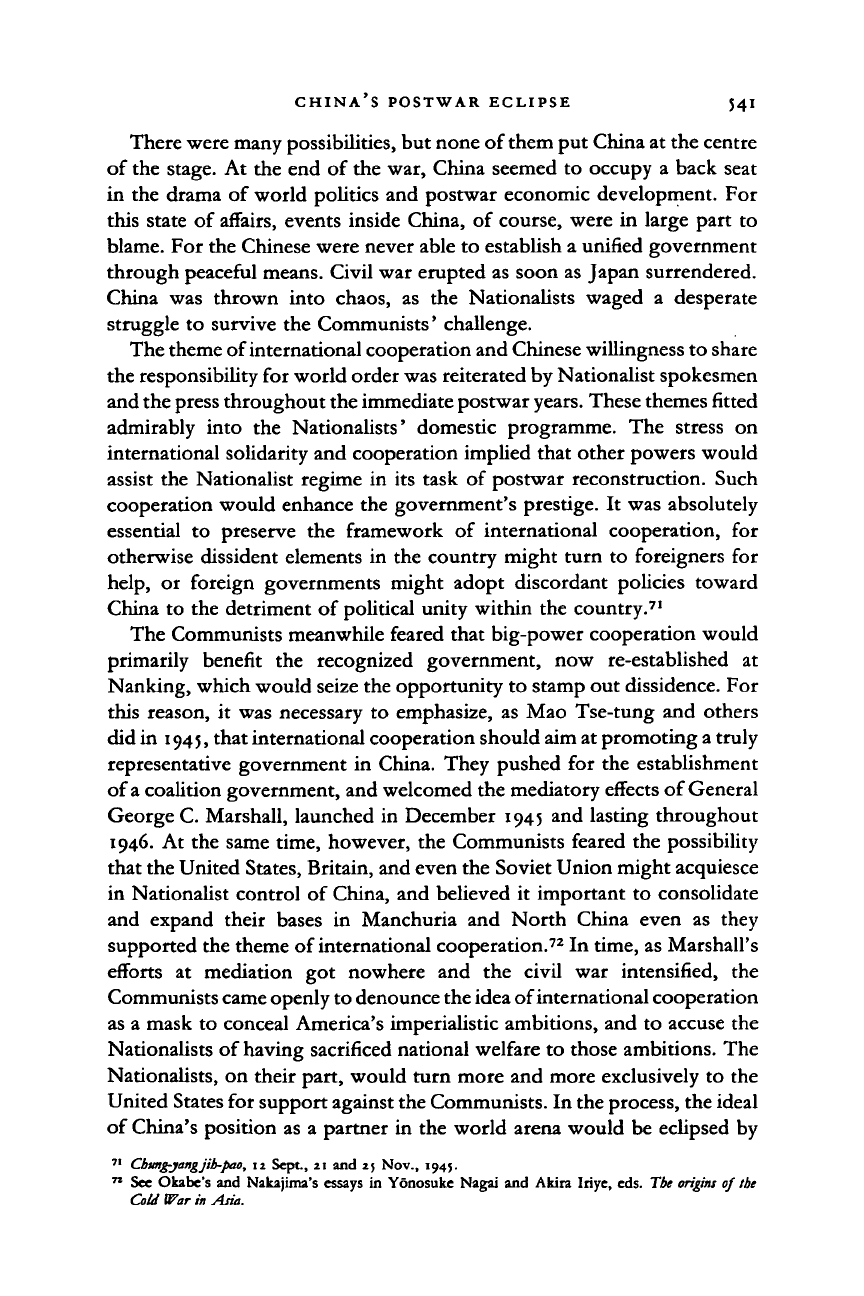
CHINA S POSTWAR ECLIPSE 541
There were many possibilities, but none of them put China at the centre
of the stage. At the end of the war, China seemed to occupy a back seat
in the drama of world politics and postwar economic development. For
this state of affairs, events inside China, of course, were in large part to
blame. For the Chinese were never able to establish a unified government
through peaceful means. Civil war erupted as soon as Japan surrendered.
China was thrown into chaos, as the Nationalists waged a desperate
struggle to survive the Communists' challenge.
The theme of international cooperation and Chinese willingness to share
the responsibility for world order was reiterated by Nationalist spokesmen
and the press throughout the immediate postwar
years.
These themes fitted
admirably into the Nationalists' domestic programme. The stress on
international solidarity and cooperation implied that other powers would
assist the Nationalist regime in its task of postwar reconstruction. Such
cooperation would enhance the government's prestige. It was absolutely
essential to preserve the framework of international cooperation, for
otherwise dissident elements in the country might turn to foreigners for
help,
or foreign governments might adopt discordant policies toward
China to the detriment of political unity within the country.
71
The Communists meanwhile feared that big-power cooperation would
primarily benefit the recognized government, now re-established at
Nanking, which would seize the opportunity to stamp out dissidence. For
this reason, it was necessary to emphasize, as Mao Tse-tung and others
did in 194
5,
that international cooperation should aim at promoting a truly
representative government in China. They pushed for the establishment
of a coalition government, and welcomed the mediatory effects of General
George C. Marshall, launched in December 1945 and lasting throughout
1946.
At the same time, however, the Communists feared the possibility
that the United States, Britain, and even the Soviet Union might acquiesce
in Nationalist control of China, and believed it important to consolidate
and expand their bases in Manchuria and North China even as they
supported the theme of international cooperation.
72
In time, as Marshall's
efforts at mediation got nowhere and the civil war intensified, the
Communists
came
openly to denounce the idea of international cooperation
as a mask to conceal America's imperialistic ambitions, and to accuse the
Nationalists of having sacrificed national welfare to those ambitions. The
Nationalists, on their part, would turn more and more exclusively to the
United States for support against the Communists. In the process, the ideal
of China's position as a partner in the world arena would be eclipsed by
71
Cbtmg-jangjib-poo, u Sept., 21 and 25 Nov., 1945.
71
See Okabe's and Nakajima's essays in Yonosuke Nagai and Akira Iriye, eds. The origins of the
Cold War
in
Asia.
Cambridge Histories Online © Cambridge University Press, 2008
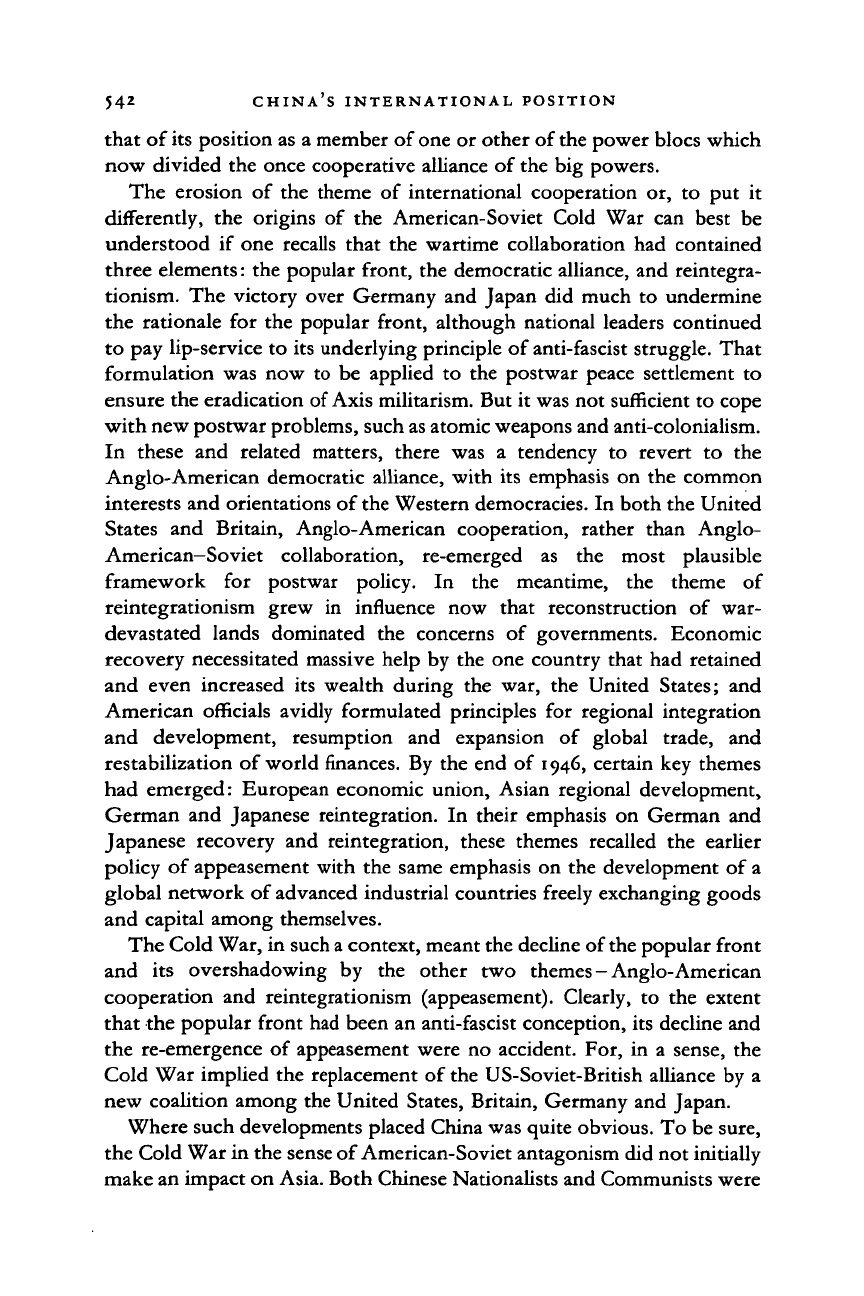
54
2
CHINA'S INTERNATIONAL POSITION
that of its position as a member of one or other of the power blocs which
now divided the once cooperative alliance of the big powers.
The erosion of the theme of international cooperation or, to put it
differently, the origins of the American-Soviet Cold War can best be
understood if one recalls that the wartime collaboration had contained
three elements: the popular front, the democratic alliance, and reintegra-
tionism. The victory over Germany and Japan did much to undermine
the rationale for the popular front, although national leaders continued
to pay lip-service to its underlying principle of anti-fascist struggle. That
formulation was now to be applied to the postwar peace settlement to
ensure the eradication of
Axis
militarism. But it was not sufficient to cope
with new postwar problems, such as atomic weapons and anti-colonialism.
In these and related matters, there was a tendency to revert to the
Anglo-American democratic alliance, with its emphasis on the common
interests and orientations of the Western democracies. In both the United
States and Britain, Anglo-American cooperation, rather than Anglo-
American—Soviet collaboration, re-emerged as the most plausible
framework for postwar policy. In the meantime, the theme of
reintegrationism grew in influence now that reconstruction of war-
devastated lands dominated the concerns of governments. Economic
recovery necessitated massive help by the one country that had retained
and even increased its wealth during the war, the United States; and
American officials avidly formulated principles for regional integration
and development, resumption and expansion of global trade, and
restabilization of world finances. By the end of 1946, certain key themes
had emerged: European economic union, Asian regional development,
German and Japanese reintegration. In their emphasis on German and
Japanese recovery and reintegration, these themes recalled the earlier
policy of appeasement with the same emphasis on the development of a
global network of advanced industrial countries freely exchanging goods
and capital among themselves.
The Cold War, in such
a
context, meant the decline of the popular front
and its overshadowing by the other two themes - Anglo-American
cooperation and reintegrationism (appeasement). Clearly, to the extent
that the popular front had been an anti-fascist conception, its decline and
the re-emergence of appeasement were no accident. For, in a sense, the
Cold War implied the replacement of the US-Soviet-British alliance by a
new coalition among the United States, Britain, Germany and Japan.
Where such developments placed China was quite obvious. To be sure,
the Cold War in the sense of American-Soviet antagonism did not initially
make an impact on Asia. Both Chinese Nationalists and Communists were
Cambridge Histories Online © Cambridge University Press, 2008
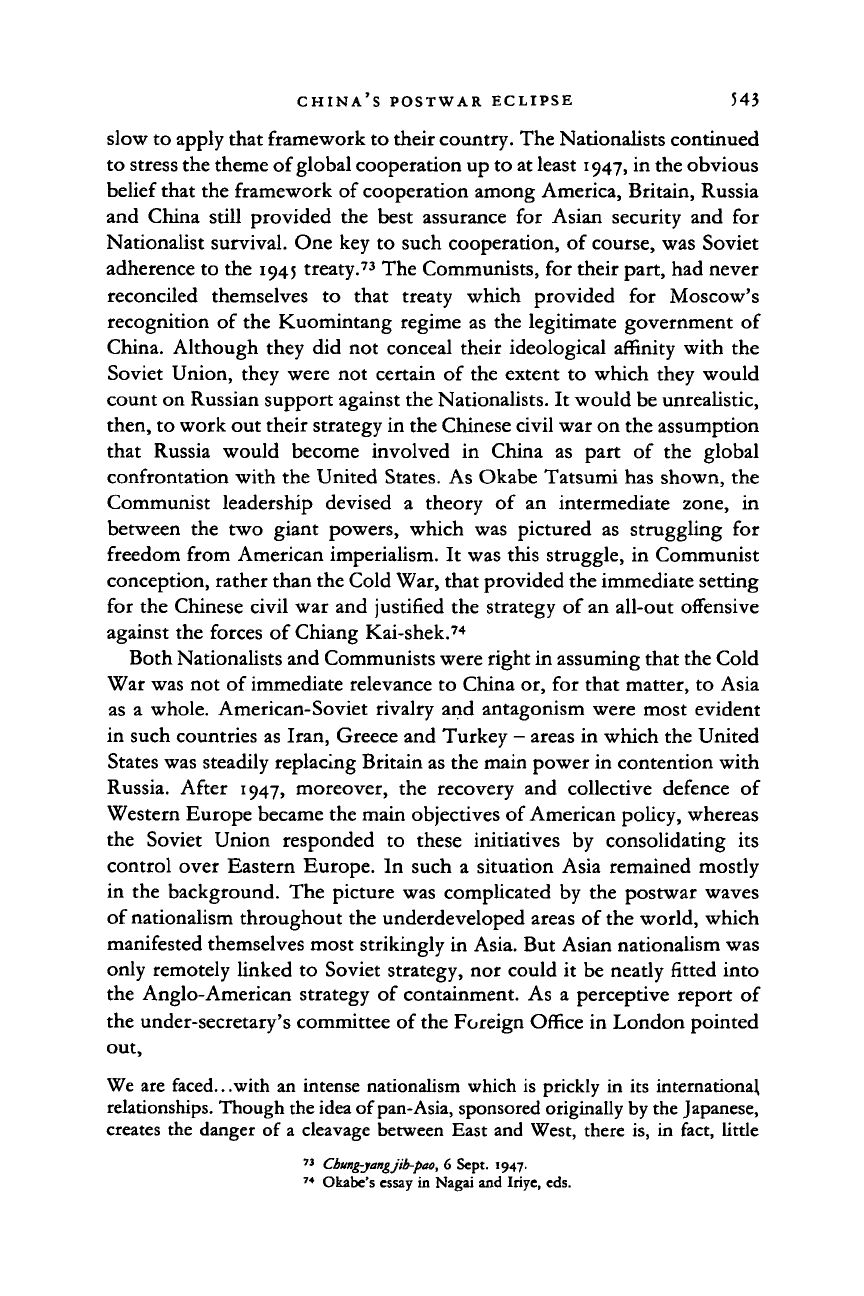
CHINA'S POSTWAR ECLIPSE 543
slow
to
apply that framework
to
their country. The Nationalists continued
to stress the theme of global cooperation
up to at
least 1947,
in
the obvious
belief that
the
framework
of
cooperation among America, Britain, Russia
and China still provided
the
best assurance
for
Asian security
and for
Nationalist survival.
One key to
such cooperation,
of
course,
was
Soviet
adherence
to the
1945 treaty.
73
The
Communists,
for
their part,
had
never
reconciled themselves
to
that treaty which provided
for
Moscow's
recognition
of the
Kuomintang regime
as the
legitimate government
of
China. Although they
did not
conceal their ideological affinity with
the
Soviet Union, they were
not
certain
of the
extent
to
which they would
count
on
Russian support against
the
Nationalists.
It
would
be
unrealistic,
then,
to
work
out
their strategy
in the
Chinese civil war
on the
assumption
that Russia would become involved
in
China
as
part
of the
global
confrontation with
the
United States.
As
Okabe Tatsumi
has
shown,
the
Communist leadership devised
a
theory
of an
intermediate zone,
in
between
the two
giant powers, which
was
pictured
as
struggling
for
freedom from American imperialism.
It was
this struggle,
in
Communist
conception, rather than the Cold War, that provided the immediate setting
for
the
Chinese civil
war and
justified
the
strategy
of
an all-out offensive
against
the
forces
of
Chiang Kai-shek.
74
Both Nationalists and Communists were right
in
assuming that the Cold
War was
not of
immediate relevance
to
China
or, for
that matter,
to
Asia
as
a
whole. American-Soviet rivalry
and
antagonism were most evident
in such countries
as
Iran, Greece
and
Turkey
—
areas
in
which
the
United
States was steadily replacing Britain as
the
main power
in
contention with
Russia. After
1947,
moreover,
the
recovery
and
collective defence
of
Western Europe became
the
main objectives
of
American policy, whereas
the Soviet Union responded
to
these initiatives
by
consolidating
its
control over Eastern Europe.
In
such
a
situation Asia remained mostly
in
the
background.
The
picture
was
complicated
by the
postwar waves
of nationalism throughout
the
underdeveloped areas
of
the world, which
manifested themselves most strikingly
in
Asia.
But
Asian nationalism
was
only remotely linked
to
Soviet strategy,
nor
could
it be
neatly fitted into
the Anglo-American strategy
of
containment.
As a
perceptive report
of
the under-secretary's committee
of
the Foreign Office
in
London pointed
out,
We
are
faced.. .with
an
intense nationalism which
is
prickly
in its
internationa\
relationships. Though the idea of pan-Asia, sponsored originally by the Japanese,
creates
the
danger
of
a cleavage between East
and
West, there
is, in
fact, little
73
Cbung-jangjib-pao,
6
Sept. 1947.
74
Okabe's essay
in
Nagai
and
Iriye,
eds.
Cambridge Histories Online © Cambridge University Press, 2008
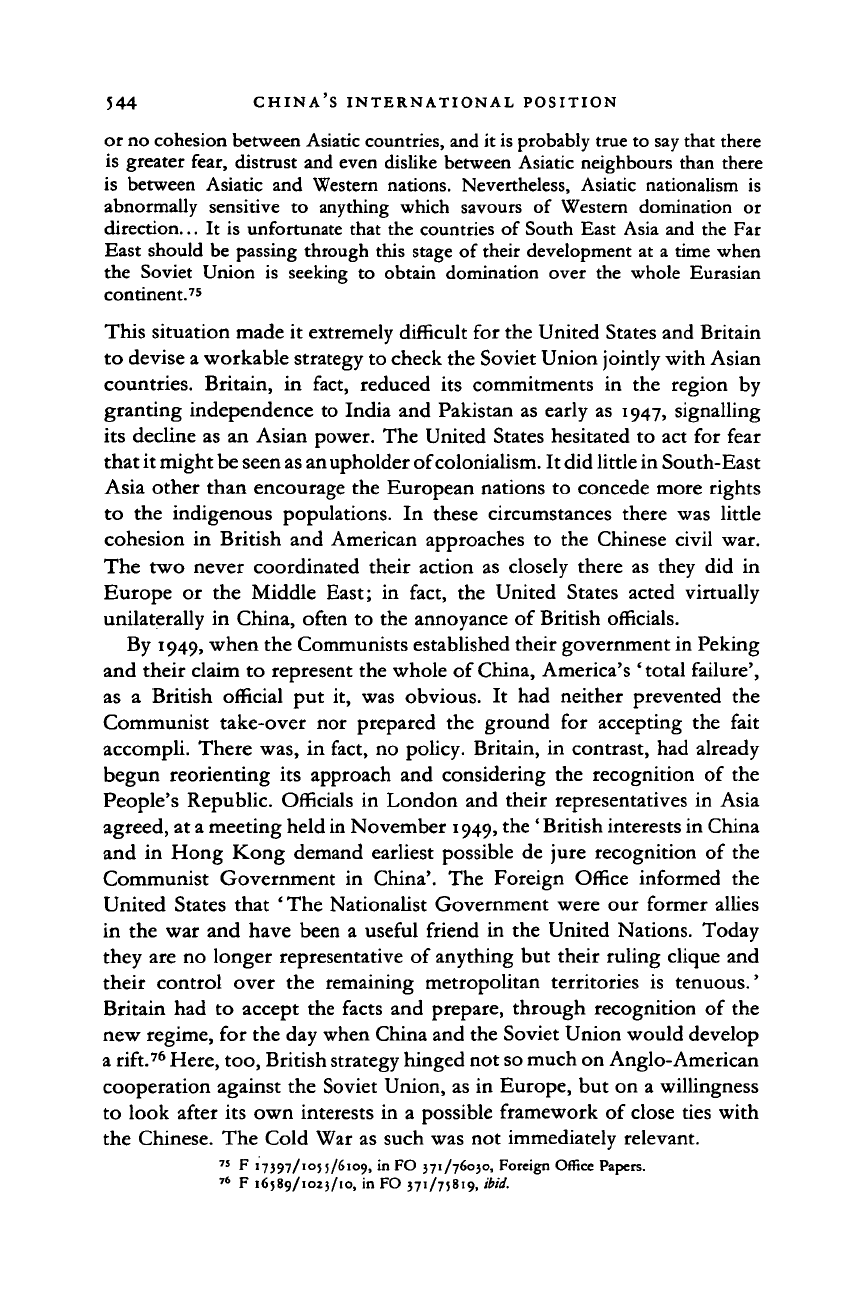
544 CHINA S INTERNATIONAL POSITION
or no cohesion between Asiatic countries, and it
is
probably true to say that there
is greater fear, distrust and even dislike between Asiatic neighbours than there
is between Asiatic and Western nations. Nevertheless, Asiatic nationalism is
abnormally sensitive to anything which savours of Western domination or
direction... It is unfortunate that the countries of South East Asia and the Far
East should be passing through this stage of their development at a time when
the Soviet Union is seeking to obtain domination over the whole Eurasian
continent.
75
This situation made it extremely difficult for the United States and Britain
to devise a workable strategy to check the Soviet Union jointly with Asian
countries. Britain, in fact, reduced its commitments in the region by
granting independence to India and Pakistan as early as 1947, signalling
its decline as an Asian power. The United States hesitated to act for fear
that it might be seen
as
an upholder of colonialism. It did little in South-East
Asia other than encourage the European nations to concede more rights
to the indigenous populations. In these circumstances there was little
cohesion in British and American approaches to the Chinese civil war.
The two never coordinated their action as closely there as they did in
Europe or the Middle East; in fact, the United States acted virtually
unilaterally in China, often to the annoyance of British officials.
By 1949, when the Communists established their government in Peking
and their claim to represent the whole of China, America's ' total failure',
as a British official put it, was obvious. It had neither prevented the
Communist take-over nor prepared the ground for accepting the fait
accompli. There was, in fact, no policy. Britain, in contrast, had already
begun reorienting its approach and considering the recognition of the
People's Republic. Officials in London and their representatives in Asia
agreed, at a meeting held in November
1949,
the 'British interests in China
and in Hong Kong demand earliest possible de jure recognition of the
Communist Government in China'. The Foreign Office informed the
United States that 'The Nationalist Government were our former allies
in the war and have been a useful friend in the United Nations. Today
they are no longer representative of anything but their ruling clique and
their control over the remaining metropolitan territories is tenuous.'
Britain had to accept the facts and prepare, through recognition of the
new regime, for the day when China and the Soviet Union would develop
a rift.
76
Here, too, British strategy hinged not so much on Anglo-American
cooperation against the Soviet Union, as in Europe, but on a willingness
to look after its own interests in a possible framework of close ties with
the Chinese. The Cold War as such was not immediately relevant.
75
F
17397/105 5/6109,
in FO
371/76030, Foreign Office Papers.
76
F
16589/1023/10,
in FO
371/75819,
ibid.
Cambridge Histories Online © Cambridge University Press, 2008
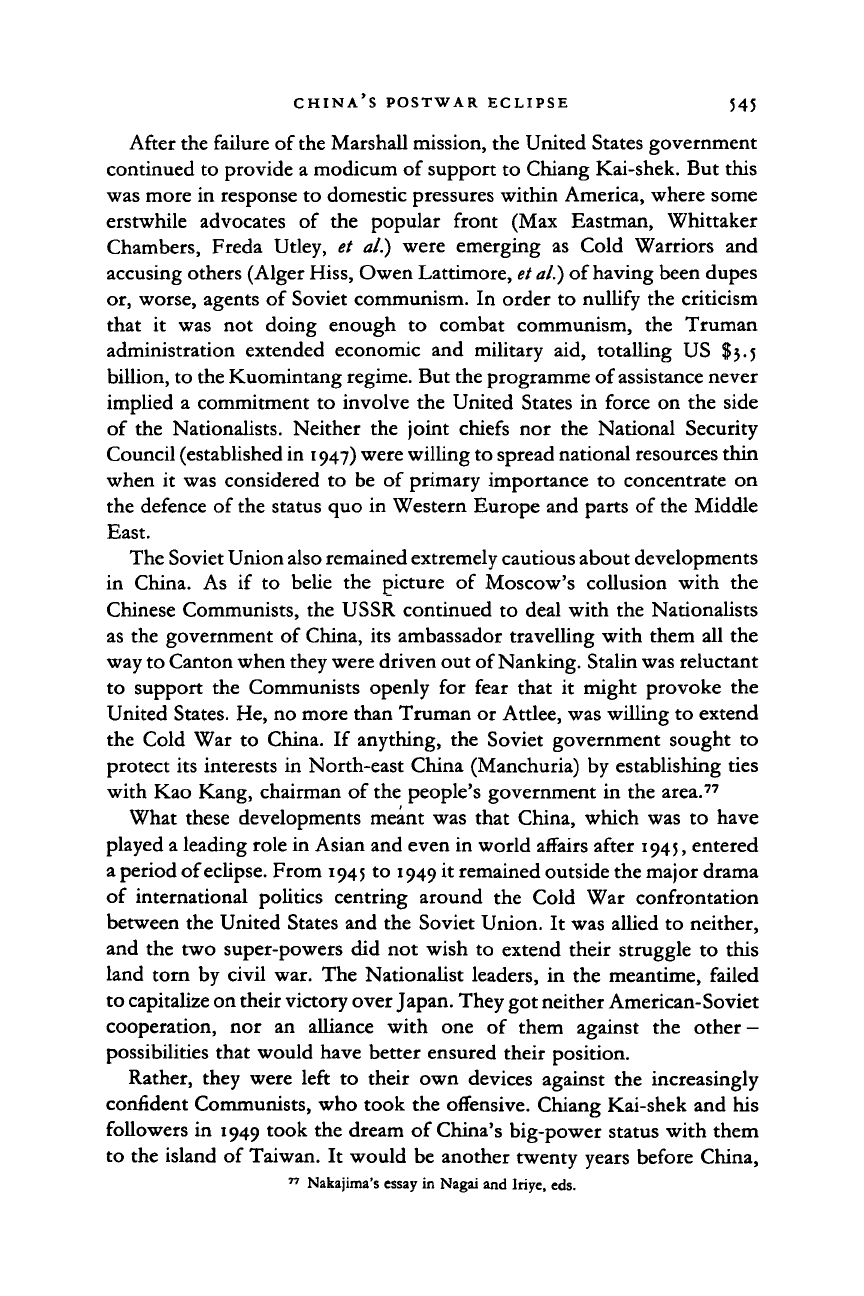
CHINA S POSTWAR ECLIPSE 545
After the failure of
the
Marshall mission, the United States government
continued to provide a modicum of support to Chiang Kai-shek. But this
was more in response to domestic pressures within America, where some
erstwhile advocates of the popular front (Max Eastman, Whittaker
Chambers, Freda Utley, et al.) were emerging as Cold Warriors and
accusing others (Alger Hiss, Owen Lattimore,
et al.)
of having been dupes
or, worse, agents of Soviet communism. In order to nullify the criticism
that it was not doing enough to combat communism, the Truman
administration extended economic and military aid, totalling US $3.5
billion, to the Kuomintang regime. But the programme of assistance never
implied a commitment to involve the United States in force on the side
of the Nationalists. Neither the joint chiefs nor the National Security
Council (established in 1947) were willing to spread national resources thin
when it was considered to be of primary importance to concentrate on
the defence of the status quo in Western Europe and parts of the Middle
East.
The Soviet Union also remained extremely cautious about developments
in China. As if to belie the picture of Moscow's collusion with the
Chinese Communists, the USSR continued to deal with the Nationalists
as the government of China, its ambassador travelling with them all the
way to Canton when they were driven out of Nanking. Stalin was reluctant
to support the Communists openly for fear that it might provoke the
United States. He, no more than Truman or Attlee, was willing to extend
the Cold War to China. If anything, the Soviet government sought to
protect its interests in North-east China (Manchuria) by establishing ties
with Kao Kang, chairman of the people's government in the area.
77
What these developments meant was that China, which was to have
played a leading role in Asian and even in world affairs after 1945, entered
a period of eclipse. From 1945 to 1949 it remained outside the major drama
of international politics centring around the Cold War confrontation
between the United States and the Soviet Union. It was allied to neither,
and the two super-powers did not wish to extend their struggle to this
land torn by civil war. The Nationalist leaders, in the meantime, failed
to capitalize on their victory over Japan. They got neither American-Soviet
cooperation, nor an alliance with one of them against the other -
possibilities that would have better ensured their position.
Rather, they were left to their own devices against the increasingly
confident Communists, who took the offensive. Chiang Kai-shek and his
followers in 1949 took the dream of China's big-power status with them
to the island of Taiwan. It would be another twenty years before China,
77
Nakajima's essay in Nagai and Iriye, eds.
Cambridge Histories Online © Cambridge University Press, 2008
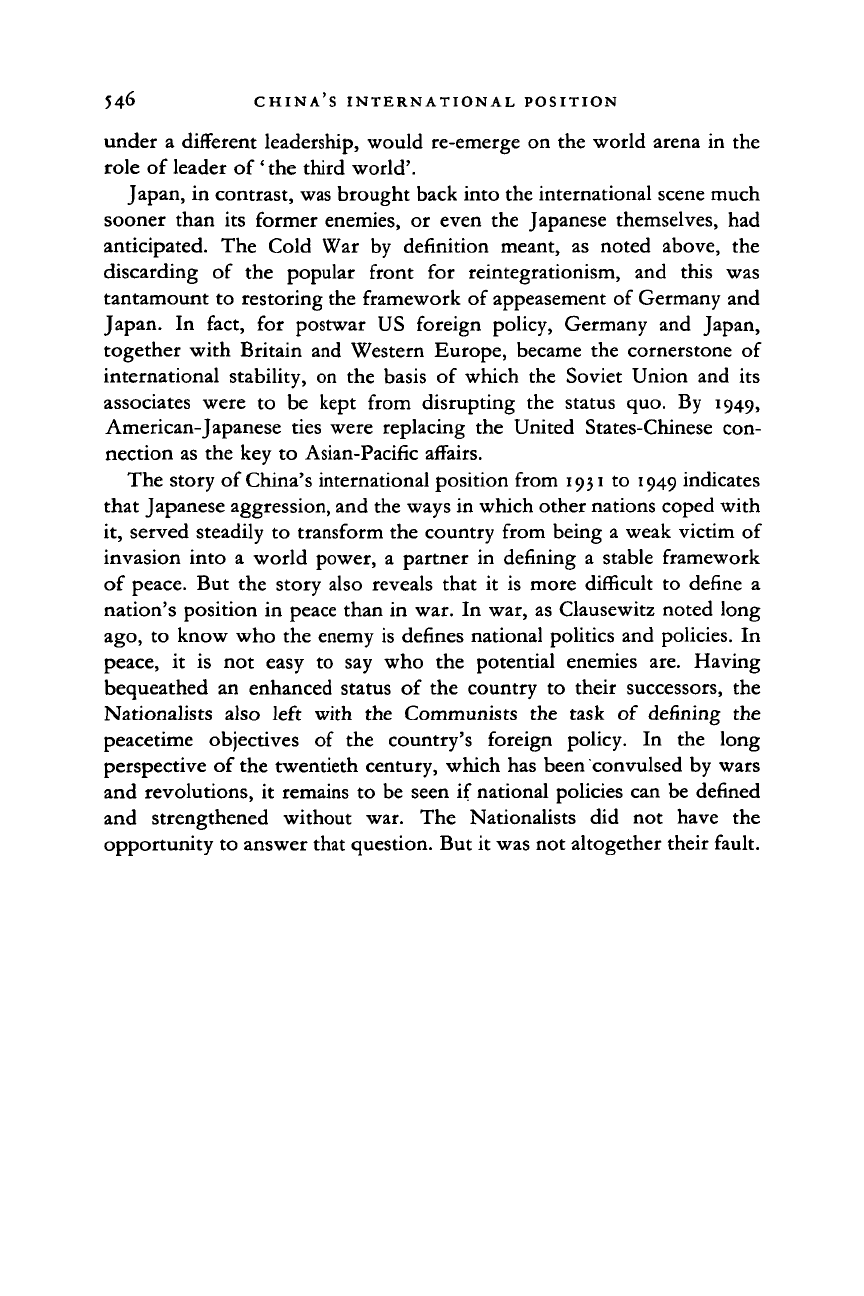
546 CHINA'S INTERNATIONAL POSITION
under a different leadership, would re-emerge on the world arena in the
role of leader of 'the third world'.
Japan, in contrast, was brought back into the international scene much
sooner than its former enemies, or even the Japanese themselves, had
anticipated. The Cold War by definition meant, as noted above, the
discarding of the popular front for reintegrationism, and this was
tantamount to restoring the framework of appeasement of Germany and
Japan. In fact, for postwar US foreign policy, Germany and Japan,
together with Britain and Western Europe, became the cornerstone of
international stability, on the basis of which the Soviet Union and its
associates were to be kept from disrupting the status quo. By 1949,
American-Japanese ties were replacing the United States-Chinese con-
nection as the key to Asian-Pacific affairs.
The story of China's international position from 1931 to 1949 indicates
that Japanese aggression, and the ways in which other nations coped with
it, served steadily to transform the country from being a weak victim of
invasion into a world power, a partner in defining a stable framework
of peace. But the story also reveals that it is more difficult to define a
nation's position in peace than in war. In war, as Clausewitz noted long
ago,
to know who the enemy is defines national politics and policies. In
peace, it is not easy to say who the potential enemies are. Having
bequeathed an enhanced status of the country to their successors, the
Nationalists also left with the Communists the task of defining the
peacetime objectives of the country's foreign policy. In the long
perspective of the twentieth century, which has been convulsed by wars
and revolutions, it remains to be seen if national policies can be defined
and strengthened without war. The Nationalists did not have the
opportunity to answer that question. But it was not altogether their fault.
Cambridge Histories Online © Cambridge University Press, 2008
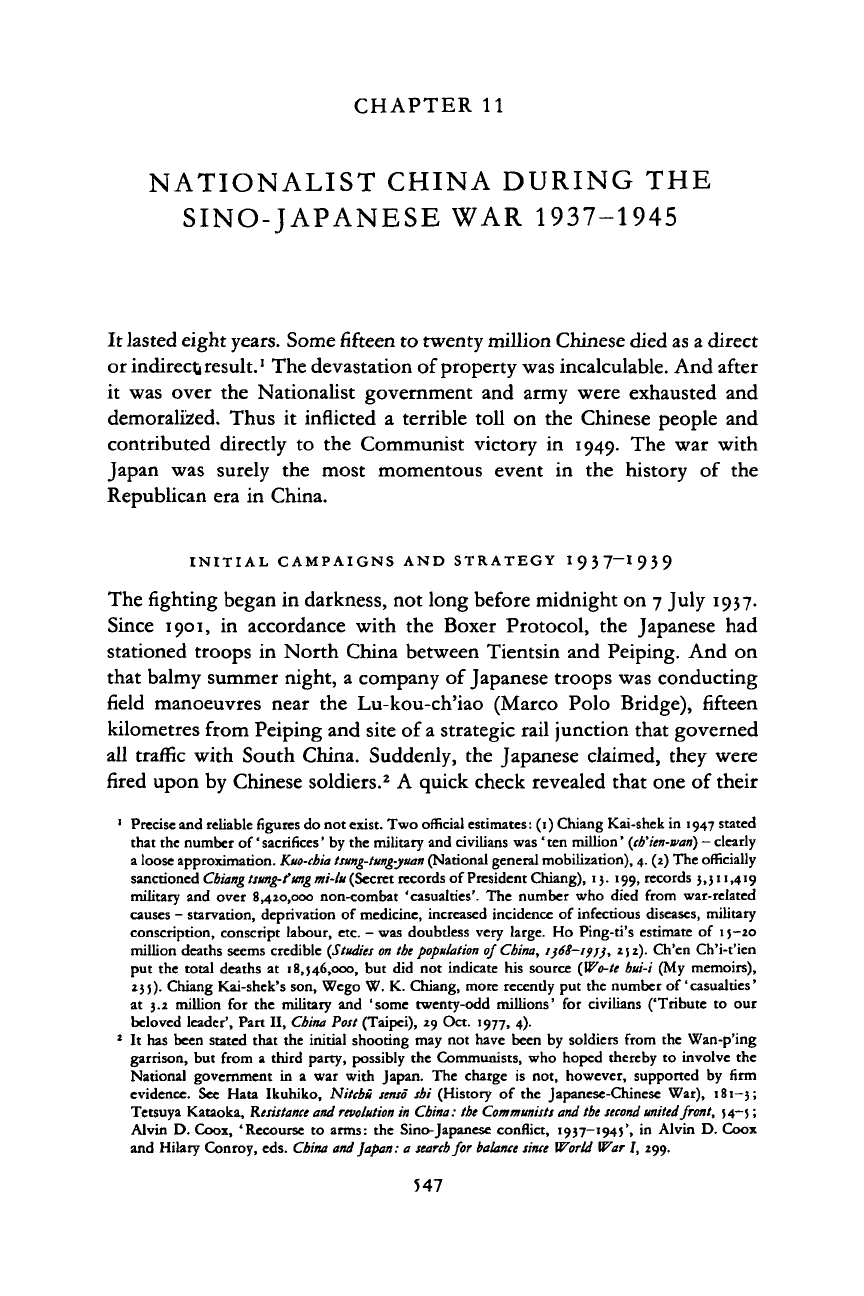
CHAPTER
11
NATIONALIST CHINA DURING THE
SINO-JAPANESE WAR 1937-1945
It lasted eight
years.
Some fifteen to twenty million Chinese died as a direct
or indirect result.' The devastation of property was incalculable. And after
it
was
over
the
Nationalist government
and
army were exhausted
and
demoralized. Thus
it
inflicted
a
terrible toll
on the
Chinese people
and
contributed directly
to the
Communist victory
in
1949.
The war
with
Japan
was
surely
the
most momentous event
in the
history
of the
Republican
era
in
China.
INITIAL CAMPAIGNS
AND
STRATEGY
I 9
3
7-1 9
3
9
The fighting began
in
darkness, not long before midnight
on
7 July 1937.
Since 1901,
in
accordance with
the
Boxer Protocol,
the
Japanese
had
stationed troops
in
North China between Tientsin
and
Peiping.
And
on
that balmy summer night,
a
company
of
Japanese troops was conducting
field manoeuvres near
the
Lu-kou-ch'iao (Marco Polo Bridge), fifteen
kilometres from Peiping and site
of
a
strategic rail junction that governed
all traffic with South China. Suddenly,
the
Japanese claimed, they were
fired upon
by
Chinese soldiers.
2
A
quick check revealed that one
of
their
1
Precise and reliable figures
do
not exist. Two official estimates:
(i)
Chiang Kai-shek
in
1947 stated
that
the
number
of'
sacrifices'
by
the
military and civilians was
'
ten million'
{cb'ten-wan) —
clearly
a loose approximation.
Kuo-cbia
tsmg-tung-yuan (National general mobilization),
4.
(2) The officially
sancaoacd
Chiang
tsung-t'ungmi-/u (Secret records
of
President Chiang),
15.
199, records 3,311,419
military
and
over 8,420,000 non-combat 'casualties'.
The
number
who
died from war-related
causes
-
starvation, deprivation
of
medicine, increased incidence
of
infectious diseases, military
conscription, conscript labour,
etc.
-
was doubtless very large.
Ho
Ping-ti's estimate
of
1
j-20
million deaths seems credible (Studies on
tie
population
of
China, ij6S-i?;j,
252).
Ch'en Ch'i-t'ien
put
the
total deaths
at
18,$46,000,
but did not
indicate
his
source (Wo-te bui-i
(My
memoirs),
235).
Chiang Kai-shek's
son,
Wego
W.
K.
Chiang, more recently
put the
number
of
casualties'
at
3.2
million
for the
military
and
'some twenty-odd millions'
for
civilians ('Tribute
to our
beloved leader', Part
II,
China Post (Taipei),
29
Oct.
1977,
4).
2
It
has
been stated that
the
initial shooting
may
not
have been
by
soldiers from
the
Wan-p'ing
garrison,
but
from
a
third party, possibly
the
Communists,
who
hoped thereby
to
involve
the
National government
in a war
with Japan.
The
charge
is not,
however, supported
by
firm
evidence.
See
Hata Ikuhiko, Nitchu senso
sbi
(History
of the
Japanese-Chinese
War),
181-3;
Tetsuya Kataoka, Resistance and
revolution
in
China: the Communists and the
second
united front, 54—5;
Alvin
D.
Coox, 'Recourse
to
arms:
the
Sino-Japanese conflict, 1937-1945',
in
Alvin
D.
Coox
and Hilary Conroy, eds. China and Japan:
a
search for
balance since
World
War I,
299.
547
Cambridge Histories Online © Cambridge University Press, 2008
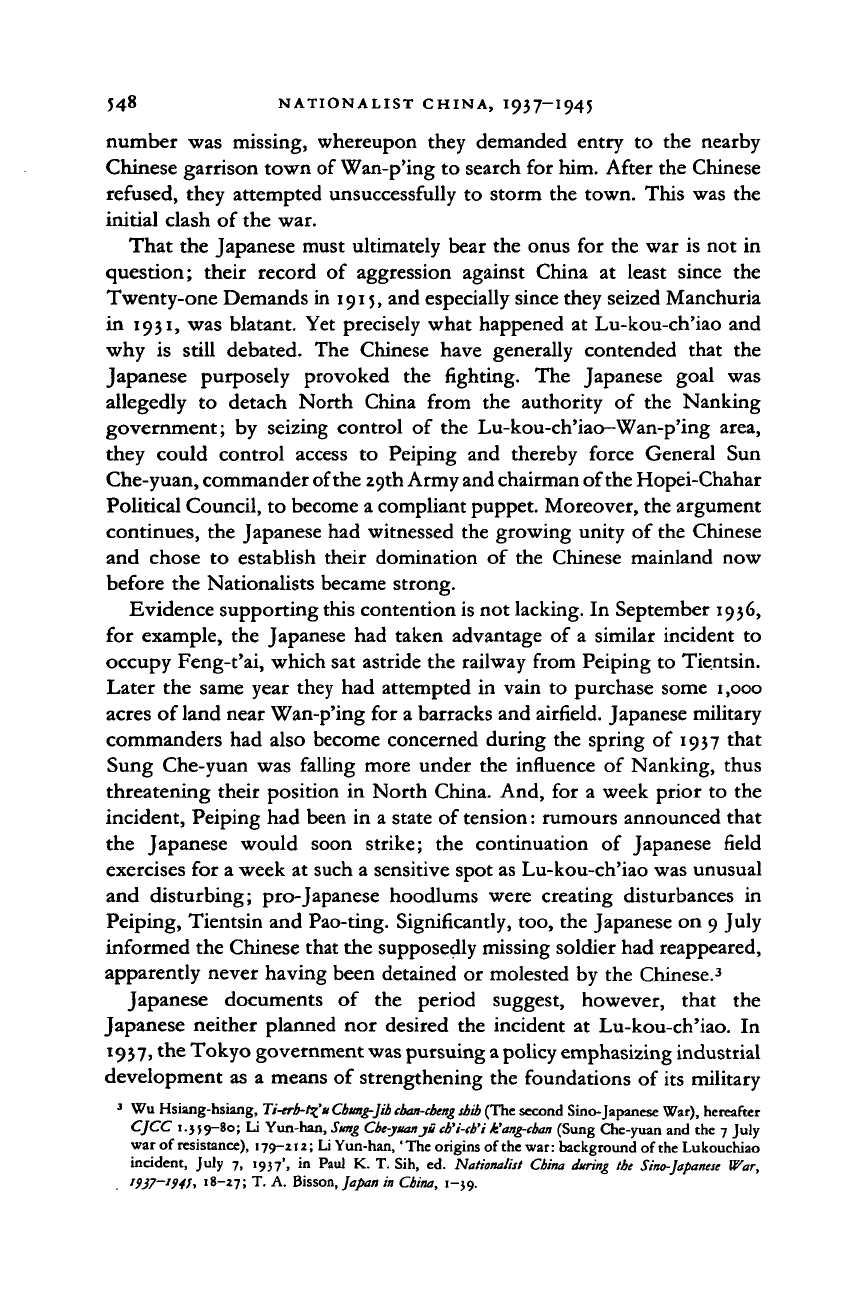
548 NATIONALIST CHINA, I937-I945
number was missing, whereupon they demanded entry
to
the nearby
Chinese garrison town of Wan-p'ing to search for him. After the Chinese
refused, they attempted unsuccessfully to storm the town. This was the
initial clash of the war.
That the Japanese must ultimately bear the onus for the war is not in
question; their record
of
aggression against China
at
least since
the
Twenty-one Demands in 1915, and especially since they seized Manchuria
in 1931, was blatant. Yet precisely what happened at Lu-kou-ch'iao and
why
is
still debated. The Chinese have generally contended that
the
Japanese purposely provoked
the
fighting.
The
Japanese goal
was
allegedly
to
detach North China from the authority
of
the Nanking
government;
by
seizing control
of
the Lu-kou-ch'iao-Wan-p'ing area,
they could control access
to
Peiping and thereby force General Sun
Che-yuan, commander of the 29th Army and chairman of the Hopei-Chahar
Political Council, to become a compliant puppet. Moreover, the argument
continues, the Japanese had witnessed the growing unity of the Chinese
and chose
to
establish their domination
of
the Chinese mainland now
before the Nationalists became strong.
Evidence supporting this contention is not lacking. In September 1936,
for example, the Japanese had taken advantage
of
a similar incident
to
occupy Feng-t'ai, which sat astride the railway from Peiping to Tientsin.
Later the same year they had attempted in vain to purchase some 1,000
acres of land near Wan-p'ing for a barracks and airfield. Japanese military
commanders had also become concerned during the spring
of
1937 that
Sung Che-yuan was falling more under the influence
of
Nanking, thus
threatening their position in North China. And, for
a
week prior to the
incident, Peiping had been in a state of tension: rumours announced that
the Japanese would soon strike;
the
continuation
of
Japanese field
exercises for a week at such a sensitive spot as Lu-kou-ch'iao was unusual
and disturbing; pro-Japanese hoodlums were creating disturbances
in
Peiping, Tientsin and Pao-ting. Significantly, too, the Japanese on 9 July
informed the Chinese that the supposedly missing soldier had reappeared,
apparently never having been detained or molested by the Chinese.
3
Japanese documents
of the
period suggest, however, that
the
Japanese neither planned nor desired the incident
at
Lu-kou-ch'iao.
In
1937,
the Tokyo government was pursuing
a
policy emphasizing industrial
development as
a
means of strengthening the foundations of its military
3
Wu Hsiang-hsiang, Ti-erb-t^u
Chung-Jib cban-cbatg sbib
(The second Sino-Japanese War), hereafter
CJCC
1.359-80;
Li Yun-han,
Sung
Cbe-juanju
(b'i-cb'i
k'ang-cban
(Sung Che-yuan and the 7 July
war of resistance), 179-z
12;
Li Yun-han,' The origins of the war: background of the Lukouchiao
incident, July
7,
1937',
in
Paul K. T. Sih, ed. Nationalist China
during
the
Sino-Japanese
War,
>937-'94h 18-27; T. A. Bisson, japan in
China,
1-39.
Cambridge Histories Online © Cambridge University Press, 2008
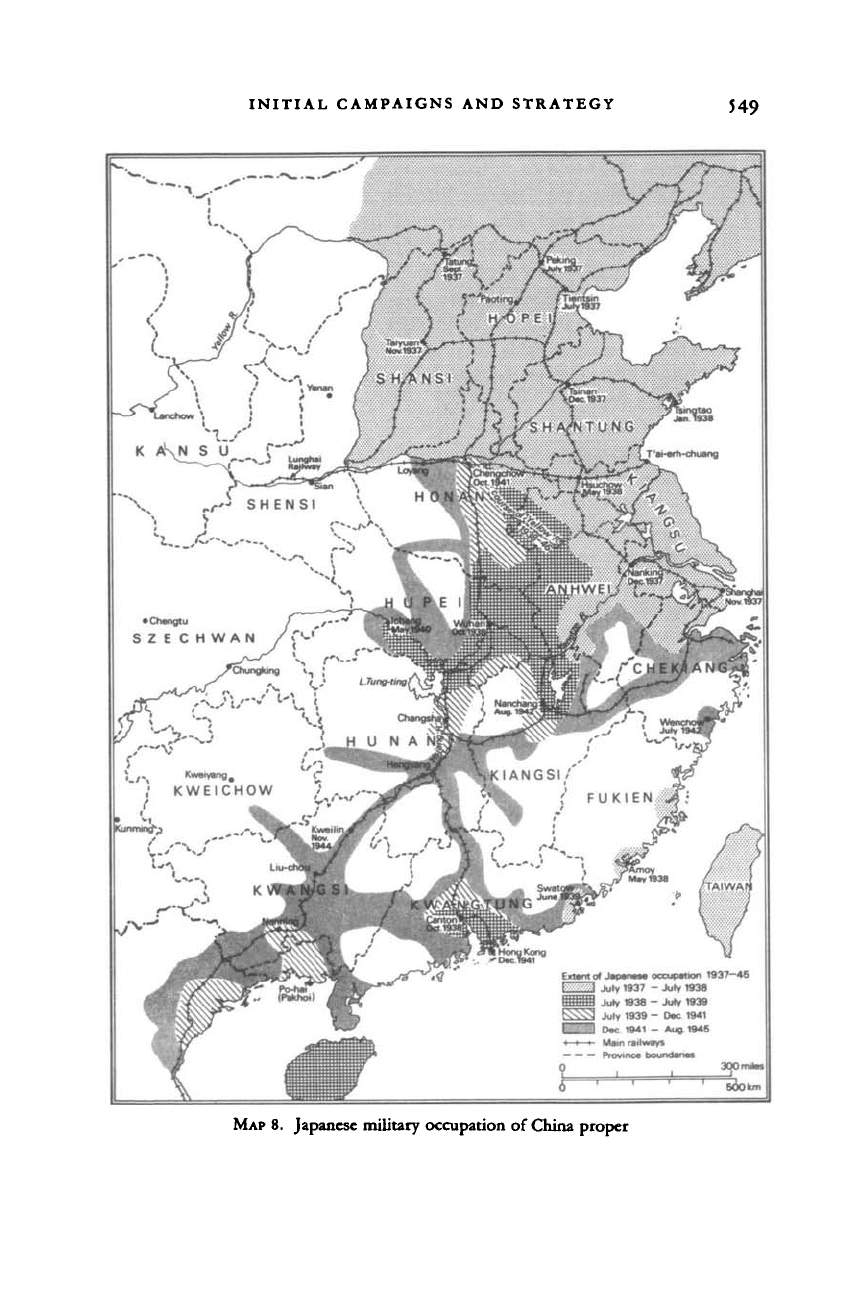
INITIAL CAMPAIGNS AND STRATEGY
549
• Changtu
SZECHWAN
/ p-
Extant
o*
Japanaa* occupation 1937-45
l>>--^vv:1 Juty 1937
-
Juty 1938
IIHIUIII July 1938
-
Juty
1939
KSNS1 July 1939
- Dae
1941
n
Dec
1941
-
Aug.
1945
*
* *
Main
railways
Province boundariaa
i3oton
MAP
8.
Japanese military occupation
of
China proper
Cambridge Histories Online © Cambridge University Press, 2008
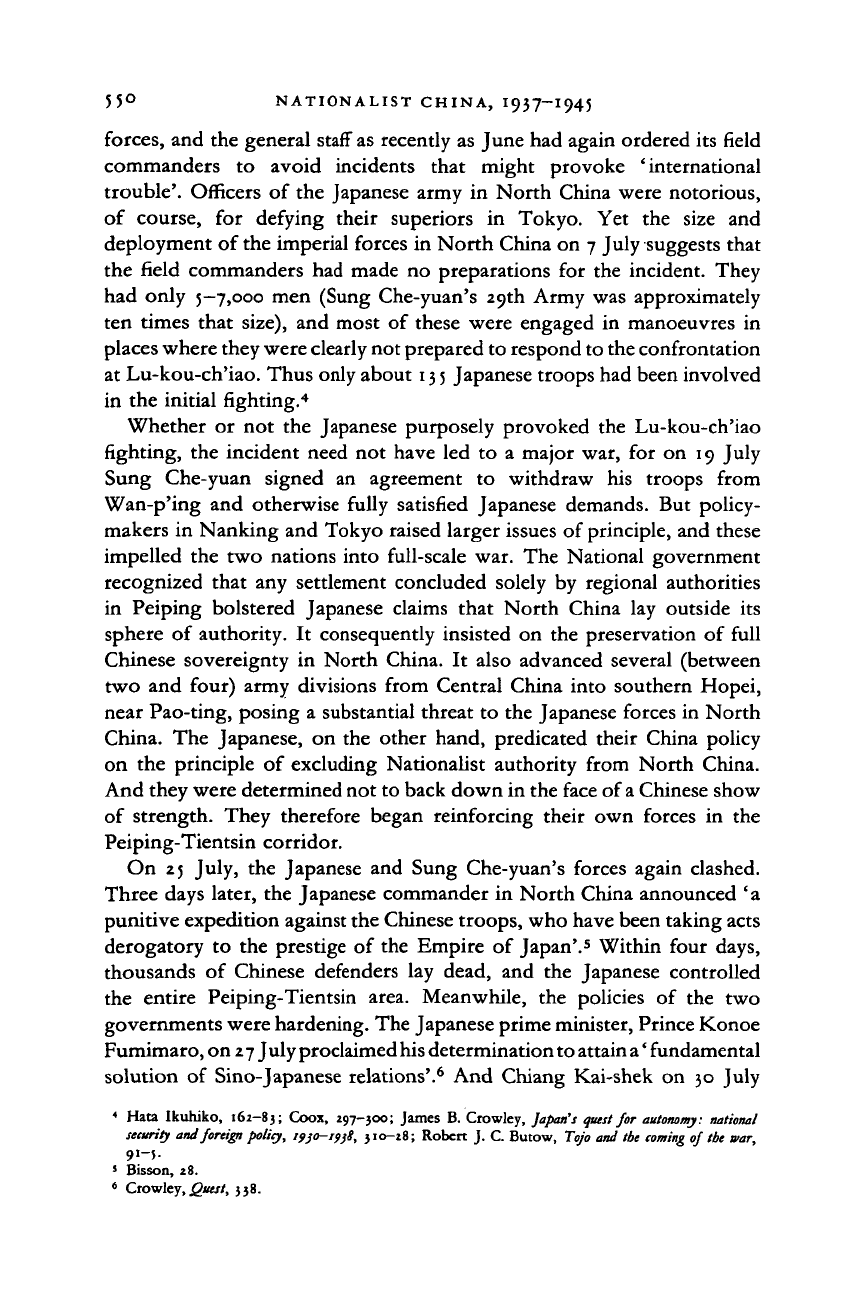
55° NATIONALIST CHINA,
forces, and the general staff
as
recently as June had again ordered its field
commanders to avoid incidents that might provoke 'international
trouble'. Officers of the Japanese army in North China were notorious,
of course, for defying their superiors in Tokyo. Yet the size and
deployment of the imperial forces in North China on 7 July suggests that
the field commanders had made no preparations for the incident. They
had only 5-7,000 men (Sung Che-yuan's 29th Army was approximately
ten times that size), and most of these were engaged in manoeuvres in
places where they were clearly not prepared to respond to the confrontation
at Lu-kou-ch'iao. Thus only about
13 5
Japanese troops had been involved
in the initial fighting.
4
Whether or not the Japanese purposely provoked the Lu-kou-ch'iao
fighting, the incident need not have led to a major war, for on 19 July
Sung Che-yuan signed an agreement to withdraw his troops from
Wan-p'ing and otherwise fully satisfied Japanese demands. But policy-
makers in Nanking and Tokyo raised larger issues of principle, and these
impelled the two nations into full-scale war. The National government
recognized that any settlement concluded solely by regional authorities
in Peiping bolstered Japanese claims that North China lay outside its
sphere of authority. It consequently insisted on the preservation of full
Chinese sovereignty in North China. It also advanced several (between
two and four) army divisions from Central China into southern Hopei,
near Pao-ting, posing a substantial threat to the Japanese forces in North
China. The Japanese, on the other hand, predicated their China policy
on the principle of excluding Nationalist authority from North China.
And they were determined not to back down in the face of
a
Chinese show
of strength. They therefore began reinforcing their own forces in the
Peiping-Tientsin corridor.
On 25 July, the Japanese and Sung Che-yuan's forces again clashed.
Three days later, the Japanese commander in North China announced
' a
punitive expedition against the Chinese troops, who have been taking acts
derogatory to the prestige of the Empire of Japan'.
5
Within four days,
thousands of Chinese defenders lay dead, and the Japanese controlled
the entire Peiping-Tientsin area. Meanwhile, the policies of the two
governments were hardening. The Japanese prime minister, Prince Konoe
Fumimaro, on 2
7
J uly proclaimed
his
determination to attain a' fundamental
solution of Sino-Japanese relations'.
6
And Chiang Kai-shek on 30 July
4
Hata Ikuhiko, 162-83; Coox, 297-300; James B. Crowley, Japan's quest for autonomy: national
security and foreign policy, ifjo-if)t, 310-28; Robert J. C Butow, Tofo and the coming of the war,
91-5.
s
Bisson, 28.
6
Ctoviley,
Quest,
338.
Cambridge Histories Online © Cambridge University Press, 2008
